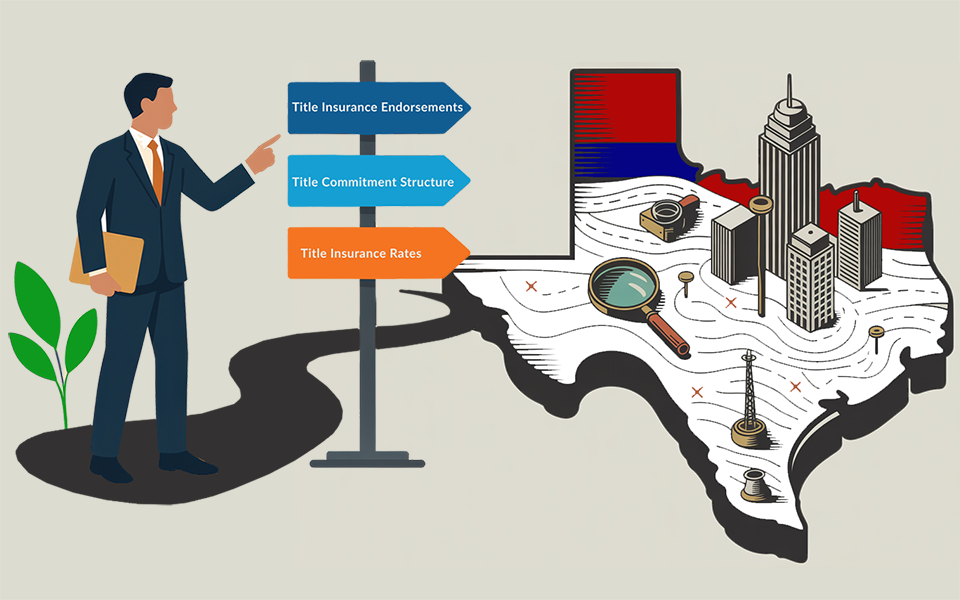December 22, 2025
Top Mistakes When Ordering a UCC Search

UCC Searches are crucial in risk assessment and due diligence in commercial lending and secured transactions. Yet despite their importance, we have witnessed countless professionals make the same costly mistakes when ordering and interpreting these vital reports. After fifteen years in the industry and helping thousands of clients navigate UCC filings, Skyline Title Support has put together this comprehensive guide to the most common pitfalls and how to avoid them.
Understanding UCC Searches: A Quick Refresher
Before diving into the mistakes, let's quickly revisit what we're discussing. Uniform Commercial Code (UCC) Searches are examinations of public records that reveal existing liens against a business or individual's personal property. Lenders file UCC statements to establish their security interest in collateral, protecting their right to seize those assets if the borrower defaults.
Think of a UCC Search as the commercial equivalent of a title search for real estate, except instead of land and buildings, we're talking about equipment, inventory, accounts receivable, and other business assets.
It seems straightforward enough, right? Unfortunately, the devil is in the details, and many professionals get tripped up.
The Top 10 Mistakes When Ordering UCC Searches
1. Searching Only the Exact Legal Name
This might be the most common mistake we encounter, and it's dangerous. Many professionals search only the exact legal name of the entity as it appears on formation documents or IDs, assuming this covers all bases. For example, searching only for "Robertson Manufacturing, Inc." when the debtor had a lien filed under "Robertson Mfg., Inc." Slight variations in spelling, punctuation, abbreviations, or corporate designations can lead to missed filings.
Best practice: Search multiple variations of the debtor's name, including common misspellings, abbreviations, and previous legal names. For individuals, search both with and without middle names or initials.
2. Ignoring Trade Names and DBAs
Similarly, failing to search "doing business as" (DBA) names and trade names can leave critical gaps in your due diligence. A business might operate under multiple names, and liens could be filed against any of them.
We recently worked with a bank that almost approved a loan secured by "clean" equipment, except that the equipment wasn't clean at all. The client searched for "Westside Plumbing Services LLC," but missed a blanket lien filed against "Westside Plumbing," the trade name the company had used for years before incorporating.
Best practice: Obtain a comprehensive list of all current and former trade names, fictitious names, and DBAs, then search each separately. This information is typically found in the business's formation documents, state business registrations, and tax filings.
3. Limiting the Search to a Single Jurisdiction
This oversight can be particularly problematic for businesses with operations in multiple states. UCCs are typically filed where the debtor is located, but that's not always the only relevant jurisdiction.
Consider a manufacturing company headquartered in Delaware but with significant operations and equipment in Pennsylvania and Ohio. Searching only Delaware records would miss liens filed in those other states. This is especially true for specific assets like equipment, which might have liens recorded in the state where the equipment is registered rather than where the business is headquartered.
Best practice: Search the debtor's state of formation or residence, plus any states where they have significant assets or operations. For businesses with complex structures, you should search at the federal level and in multiple states.
4. Rushing the Timeline
There's constant pressure to close deals quickly in a fast-paced business environment. However, rushing UCC searches can lead to incomplete results and missed filings.
Filing offices don't update their records instantaneously. Some county offices process filings manually, creating backlogs that can stretch weeks or months. If you order a rush search, you might get results back quickly, but those results might not include recently filed liens in the processing queue.
Skyline has seen this timing issue repeatedly derail transactions. Just last year, a client closed a loan based on a "clean" UCC Search, only to discover two weeks later that a significant tax lien had been filed against the borrower before closing but hadn't yet appeared in the search results.
Best practice: Build adequate time into your transaction timeline for thorough searches, and plan to run an updated search as close to closing as possible. Consider adding provisions to your loan documents that require the borrower to disclose any filings they're aware of that might not yet appear in public records.

5. Failing to Order Certified Search Reports
Many online services offer "instant" UCC search results, which can be tempting because of their convenience and lower cost. However, these unofficial searches don't provide the same legal protections as certified reports obtained directly from the filing office.
Under UCC Article 9, certain legal protections are only available with certified searches. You might not be protected if you're relying on an uncertified search and miss a financing statement because of a filing office error.
Best practice: Always order certified searches directly from the relevant filing offices or through a service provider like Skyline Title Support that obtains official certification for significant transactions. The additional cost is minimal compared to the risk you're mitigating.
6. Misinterpreting Search Results
UCC Search reports can be confusing documents, especially for those who don't work with them regularly. Misinterpreting the results is a common mistake that can have serious consequences.
One particular area of confusion involves "continued" filings. A UCC-1 financing statement is generally effective for five years, after which it lapses unless a continuation statement is filed. We have seen numerous cases where professionals mistakenly assumed a lien had expired, only to miss that it had been continued through a UCC-3 continuation statement. A UCC-3 continuation is a type of filing that extends the life of the financial statement by another five years.
Similarly, terminated filings often appear on search reports, leading some to incorrectly conclude that liens have been removed when they haven't.
Best practice: Review the entire search report carefully, especially considering continuation statements, amendments, and termination statements. If you're unsure about interpreting any aspect of the results, consult with a UCC specialist or legal counsel.
7. Not Searching All Relevant Parties
Another common oversight is failing to search all relevant parties in a transaction. It's not just the primary borrower that matters; guarantors, co-borrowers, and related entities might also have liens that could affect the transaction.
We can recall a situation where a lender searched only the borrowing entity, a recently formed LLC, and found no liens. What they missed were multiple tax liens against the LLC's owner personally, who was also a guarantor on the loan. Had they also searched the guarantor, they would have discovered significant credit issues that ultimately led to default.
Best practice: Identify all parties relevant to the transaction – borrowers, co-borrowers, guarantors, and related entities – and run appropriate searches on each. Consider creating a diagram of the relationships for complex corporate structures to ensure you haven't missed any key entities.
8. Overlooking Non-UCC Liens and Encumbrances
UCC filings are just one type of lien that can affect personal property. Tax liens, judgment liens, mechanic's liens, and other encumbrances might not appear in a standard UCC Search but can still impact the priority of your security interest.
Skyline has worked with numerous clients who thought they had first-position security interests, only to discover federal tax liens that took priority over their UCC filings. These separate searches are often overlooked in the due diligence process.
Best practice: Besides UCC Searches, order separate searches for tax liens (federal, state, and local), judgment liens, pending litigation, and bankruptcy filings. While this adds some cost and time to your due diligence process, it provides a more comprehensive picture of potential encumbrances.
9. Relying on Debtor Representations Without Verification
It's surprisingly common for lenders to accept a borrower's representation that there are no liens against their assets without independent verification. While most borrowers aren't deliberately deceptive, they might not fully understand what constitutes a lien or might have forgotten about older filings.
Skyline has seen instances where borrowers genuinely believed liens had been terminated when they hadn't been, or where they didn't realize that equipment leases or vendor financing arrangements had resulted in UCC filings against them.
Best practice: Always verify through independent searches, regardless of the borrower's representations. Consider requesting account statements or payoff letters from existing lenders to confirm current balances and lien status.
10. Failing to Follow Up on Unclear or Concerning Results
When a search reveals potential issues, such as unexpected liens, name variations, or confusing filing information, many professionals ignore these red flags or make assumptions without proper follow-up.
We recently helped a client who had discovered a UCC filing against their potential borrower from a lender they hadn't disclosed. Rather than immediately declining the loan, we investigated further and found it was for a different company with a similar name. Without that follow-up, they would have lost a valuable client relationship.
Best practice: Treat concerning search results as opportunities for further investigation rather than immediate deal-killers. Request additional information from the borrower, contact the secured parties listed for clarification, or consult a UCC specialist to interpret ambiguous results.
The Real-World Impact of UCC Search Mistakes
These mistakes aren't just theoretical – they lead to real financial and legal consequences. Here are some actual situations Skyline Title Support has encountered where UCC search errors resulted in significant problems:
- A lender failed to search variant spellings of a corporate name and missed a blanket lien on all the borrower's assets. When the borrower defaulted, the lender discovered that their $2 million "secured" loan was unsecured.
- An equipment finance company searched only in the state where their borrower was headquartered, and missing liens were filed in three other states where the equipment was located. Their supposedly first-position security interest was actually fourth in line.
- A bank relied on a non-certified search from an online service that missed a recent filing. When the borrower filed bankruptcy six months later, the court determined the bank did not have a perfected security interest because it couldn't claim the protection of the filing office search logic.
Best Practices for Error-Free UCC Searches
To avoid these common mistakes, consider implementing these comprehensive best practices in your UCC Search process:
Create a Standardized Checklist
Develop a detailed checklist for each transaction that includes:
- Full legal name of the debtor
- All name variations to be searched
- Trade names and DBAs
- All relevant jurisdictions
- Types of searches (UCC, tax liens, judgments, etc.)
- The parties responsible for each search
- Deadlines for preliminary and final searches
Document Your Search Methodology
Maintain clear records of your search process, including:
- Search terms used
- Databases and jurisdictions searched
- Dates searches were conducted
- Who conducted the searches
- Any limitations or issues encountered
This documentation can be valuable evidence if the validity of your security interest is ever challenged.
Develop Internal Expertise
Designate and train specific team members to become UCC Search specialists. These individuals should:
- Stay current on UCC filing requirements and search methods
- Understand the nuances of different state filing systems
- Know how to interpret complex search results
- Be able to identify potential red flags
Consider Professional Assistance
For high-value or complex transactions, consider engaging professional search services like Skyline Title Support that specialize in UCC and lien searches. We offer:
- Experience with various state filing systems
- Knowledge of local filing peculiarities
- Standardized search methodologies
- Added liability protection through errors and omissions insurance
The Future of UCC Searches
As we look ahead, we see several trends that will impact how UCC searches are conducted:
- Increased Digitization: More filing offices are moving to fully electronic systems, which should eventually reduce processing backlogs and improve search accuracy.
- Improved Search Algorithms: Search technologies are becoming more sophisticated, potentially reducing name variations and misspellings issues.
- Blockchain Applications: Some jurisdictions are exploring blockchain technology for UCC filings, which could create immutable, easily searchable records.
- Artificial Intelligence Assistance: AI tools are beginning to help interpret search results and identify potential issues that might require further investigation.
While these advances are promising, they won't eliminate the need for human expertise and careful attention to detail in the UCC Search process.
Conclusion
UCC Searches are a critical component of risk management in secured lending, but they're only effective when conducted properly. The mistakes outlined in this article have cost lenders millions in losses and legal fees over the years.
By understanding these common pitfalls and implementing robust search practices, you can significantly reduce your risk of encountering unpleasant surprises down the road. Remember that a thorough UCC Search is an investment in your transaction's security, not merely a box to check in your due diligence process.
At Skyline Title Support, we've helped countless clients navigate these complexities and develop effective UCC Search strategies. If you have questions about your UCC search process or need assistance with a particular transaction, our team of specialists is always available to help.
Related Posts
How to Read a Title Commitment: 12 Exceptions That Scare Buyers (But Don’t Always Kill the Deal)
If you have ever opened a title commitment and felt your stomach drop when you hit the exceptions, you are not alone. Buyers often see a long ....
January 31, 2026
2026 Title Industry Outlook: Top 10 Trends That Will Redefine Due Diligence and Closings
The title industry is heading into 2026 with more moving parts than at any time in recent memory: rapid regulatory change, deeper fraud risk ...
December 22, 2025
Beyond the Basics: Navigating Title Complexity in Texas Commercial Real Estate
Last spring, a Dallas investor was three days from closing on a mixed-use development site when the title examiner discovered something unusual ...
December 22, 2025
Witchy Titles & Cursed Closings: What Salem’s History Can Teach Us About Real Estate Due Diligence
In 1692, the town of Salem, Massachusetts descended into chaos. Fueled by fear, rumors, and suspicion, dozens of people were accused of witchcraft and ...
December 22, 2025
Title Under Siege: A First Look at Our New Guide to Deed Fraud and Seller Impersonation
Seller impersonation, in particular, is on the rise. In these cases, a scammer poses as the property owner—usually targeting vacant land, rental...
December 22, 2025
Real Estate Due Diligence Checklist: 9 Hidden Costs That Kill Closings
Imagine this: A $3.2 million Miami Beach home sale implodes because of a $127 unpaid utility lien that no one caught in time. Absurd as it sounds ...
December 22, 2025
Mastering UCC Searches: A Comprehensive Guide for Title Professionals and Lenders
In the world of commercial real estate and lending, due diligence is everything. Whether you're a title agent preparing for a closing in New York ...
December 22, 2025
Land Surveys vs. Title Searches: When You Need Both (and How to Budget)
Picture this: you’re days away from closing on a home when an unexpected hiccup surfaces. The seller’s old fence sits two feet inside the neighbor’s...
December 22, 2025
Top 10 Municipal Red Flags That Can Delay Your Closing (and How to Fix Them)
Real-estate contracts are filled with dates, deposits, and delivery deadlines. Yet even when buyers, sellers, and lenders stay on schedule ...
December 22, 2025
How Can Large Title Companies Thrive in Volatile Times?
When mortgage rates climbed to 23-year highs in late 2023, one national title insurer watched transaction volume plummet 45% over eight weeks yet ...
December 22, 2025
Summer Real Estate: Keep Closings Cool When the Market Heats Up
Summer signals one of the busiest times in real estate, especially in Florida, as well as in fast-growing markets like Texas, Arizona, and ...
December 22, 2025
Navigating Florida’s Title Regulations for Small Title Agencies
Running a small to mid-sized title agency in Florida can feel like juggling flaming torches—there’s licensing, escrow accounting, audits, data security ...
December 22, 2025
The Title Pro's AI Companion: Using Skyline's SmartTitle Assistant
How much time did you spend drafting repetitive client emails today? Our average title professional saves 5+ hours weekly using SmartTitle Assistant™ ...
December 22, 2025
UCC Search vs. Title Search: What's the Difference — and Do You Need Both?
In the complex world of real estate transactions, due diligence is everything. Whether you're a lender evaluating a loan application, an investor ...
December 22, 2025
Navigating Market Volatility: What Title Professionals Need to Know Now — and What's Ahead in 2025
In today's real estate landscape, the only constant is change. Fluctuating interest rates, economic uncertainty, and shifting regulatory policies have ...
December 22, 2025
What Happens if a Satisfaction of Mortgage is Not Properly Recorded?
Paying off a mortgage is a significant financial milestone, but the process isn’t complete until the lender records the mortgage satisfaction with the ...
December 22, 2025
Generating New Business for Title Companies in a Competitive Market
The title industry is transforming. Increased competition, technological advancements, and shifting consumer expectations are challenging traditional ...
December 22, 2025
Spring Cleaning for Your Property Title: How to Refresh Your Real Estate Records
Millions of real estate transactions are delayed or fall apart each year due to title issues that could have been prevented. In fact, a recent study ...
December 22, 2025
Top Strategies to Prevent Quiet Title Issues
Quiet title disputes are a serious concern for real estate professionals, as they can disrupt transactions and create uncertainty around property ownership ...
December 22, 2025
Title Services for New Construction: What Builders and Developers Need to Know
The construction of a new home or commercial property is an exciting and ambitious project, but it comes with more than just design and building ...
December 22, 2025
Will AI Agents Replace Title Professionals? The Truth About Automation
Artificial intelligence (AI) has evolved beyond simple data analytics and chatbots. Today's AI "agents" can interact with web browsers, gather and analyze ...
December 22, 2025
10 Reasons Why Skipping a Land Survey Can Be Costly
A land survey might seem like an unnecessary expense, especially if the property has been owned for years without any issues. However, skipping this step ...
December 22, 2025
Title Industry 2.0: Harnessing AI, Data, and Cybersecurity for a Resilient Future
The title industry is at a crossroads. Traditional methods that have served us well for decades now face mounting challenges in an increasingly ...
December 22, 2025
How Title Services Impact Mortgage Underwriting Timelines
In the world of real estate, the journey from application to closing is filled with numerous moving parts. Among these, title services are a crucial yet ...
December 22, 2025
How Title Companies Can Meet Tight Deadlines Without Sacrificing Quality
In today's fast-paced real estate environment, speed is crucial. Title companies often find themselves in high-pressure situations where they must juggle ...
December 22, 2025
5 New Year's Resolutions for Title Companies in 2025
As 2025 kicks off, the title industry is moving faster than ever. With new technologies, shifting customer needs, and more complex regulations, there’s ...
December 22, 2025
How to Explain Title Insurance to Your Clients: A Real Estate Agent's Guide
Explaining title insurance isn't always straightforward, but with the right approach, it can become a valuable teaching moment for your clients. Picture this ..
December 22, 2025
The Hidden Complexities of Property Title Searches
You've found your dream home. The price is right, the location is perfect, and you're ready to sign on the dotted line. But before you do ...
December 22, 2025
5 Common Problems Found in Municipal Lien Searches and How to Resolve Them
Municipal lien searches are a crucial part of any real estate transaction. They uncover hidden financial and legal obligations tied to a property, ensuring ...
December 22, 2025
What’s Next for the Title Industry? Key Trends for 2025
The title industry is at a pivotal moment, with 2025 shaping up to be a year of significant transformation. From groundbreaking technologies like blockchain ...
December 22, 2025
Commercial Property Title Due Diligence: Going Beyond the Basics
The landscape of commercial property title due diligence has transformed dramatically over the past three decades. Gone are the days when a basic title ...
December 22, 2025
Beyond the Standard Search: Advanced Commercial Title Due Diligence in Florida
Last month in South Florida, a seasoned commercial real estate investor nearly walked away from a $12 million mixed-use development purchase ...
December 22, 2025
Navigating the Cyber Minefield: A Title Professional's Complete Guide to Phishing Defense
The title industry is a prime target for cybercriminals, and phishing is one of the most common threats that title professionals face today. Imagine this ...
December 22, 2025
Elevating Your Title Company to New Heights - A Blueprint for Growth
Let's be honest – growing a title company isn't what it used to be. Gone are the days when simply maintaining the status quo was enough to ...
December 22, 2025
This Halloween Avoid Real Estate Nightmares: 5 Spooky Title Issues That Can Haunt You
Buying a new home is exciting, but not all surprises are welcome. Some title issues can be like ghostly figures lurking in the shadows ...
December 22, 2025
How to Overcome Common Title Operations Challenges and Boost Efficiency
Running a title company means you’re a key player in the real estate world, making sure property transactions go smoothly and securely. But, we get it ....
December 22, 2025
🎙️QuickCast: Future Trends in the Title Industry.
The title industry, like many others, is undergoing significant transformation due to technological advancements. While some of these changes ...
December 22, 2025
Understanding Municipal Lien Searches: A Complete Guide
Imagine this scenario: You've discovered an incredible property, yet as the closing date approaches, an unsettling surprise reveals itself—a municipal lien...
December 22, 2025
Wire Fraud : Proven Defense Tactics for Title Professionals
Wire fraud is a rapidly growing threat in the real estate industry, with fraudsters becoming more sophisticated and aggressive in their ...
December 22, 2025
Preparing for August 17th: Essential Information on the NAR Broker Commission Changes
The real estate market is about to undergo significant changes as new commission regulations take effect on August 17. These changes ...
December 22, 2025
Maximize Efficiency in Your Title Business with AI
Integrating AI into title businesses can significantly enhance efficiency, accuracy, and customer service. By automating routine tasks, improving...
December 22, 2025
The Importance of Land Surveys in Property Transactions: What You Need to Know
Boundary surveys are essential in property transactions to accurately define property lines, identify encroachments, and resolve disputes. Conducted ...
December 22, 2025
Summer Selling Season: Essential Steps for Real Estate Pros to Ensure Smooth Transactions
Essential steps for real estate professionals to ensure smooth transactions during the bustling summer selling season include preparing properties, ...
December 22, 2025
A Step-by-Step Guide to Conducting a Thorough Municipal Lien Search
A thorough municipal lien search is crucial for uncovering any financial or legal claims against a property. This step-by-step guide ....
December 22, 2025
Recent Posts




















































.png)

